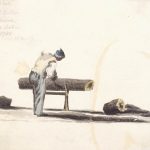
Connecting Indigenous and Diasporic Literatures: Two Approaches
This section offers two approaches for connecting Indigenous and diasporic texts, one that explores where these literatures share common ground, and one that is attuned to those places where they diverge. The Margins as Common Ground: Race, Lost Homelands, and Belonging In her sharply titled essay “Decolonizasian,” Rita Wong asks: “What happens if we position […]
Questions
Emigration and Settlement How does Moodie characterize the dealers in wild lands in her Introduction? Consider how Moodie describes the motivations to emigrate and her experiences and feelings about the process in the Introduction. What is the mood of this section, and how does she address common misconceptions of emigration and the newly adopted land? […]
Assignment: Contextualizing Literature
Overview This two-page assignment provides an opportunity to summarize the novel and to contextualize it in relation to a key topic. It involves library and Internet research and requires proper documentation. Complete the assignment as a two-page handout for your classmates; whether it is done on paper or in electronic format, it should be easily […]
Translation
Translation and Orality Textualized orature is a kind of translation. The cliché in translation studies is that something is always lost in translation, but without translation many great works would be inaccessible. Works of literature become meaningful in specific social, cultural, and linguistic contexts. Translation requires remediation, which means that all translations have to adapt […]
E. Pauline Johnson (Tekahionwake)
A Cultural Ambassador E. Pauline Johnson (Tekahionwake; 1861–1913) was a popular poet, critic, and performer. In this chapter, we address a small sampling of her wide range of poems and prose. The life and career of Pauline Johnson has been the subject of renewed academic attention since the 1960s, in particular with the growing interest […]
Indigenous Literary History (1960s-1990)
1960s: The Decade of Social Change Several important political developments in the 1960s helped strengthen Indigenous nationalism in Canada. Until the 1960s, Status Indians—peoples legally recognized by the Indian Act—lacked many rights enjoyed by Canadian citizens, as the Indian Act categorized them as wards of the state (see Erin Hanson’s The Indian Act). They gained […]
The Year 1990
1990 marks a milestone in Indigenous literary history in Canada. Since 1990, the availability of Indigenous writings has steadily grown, indicated in part by the increasing diversity represented within anthologies by Thomas King (1990), Joel Maki (1995), Daniel David Moses and Terry Goldie (multiple editions: 1992; 1998; 2005; 2013 with Armand Garnet Ruffo), and Jeannette […]
Indigenous Literary Nationalism
Land disputes, legislative challenges, and other societal pressures have prompted the increasing expression of Indigenous national sovereignty across North America. As Cherokee writer Daniel Heath Justice argues, Indigenous nationhood is more than simple political independence or the exercise of distinctive cultural identity; it is also an understanding of a common social interdependence within the community, […]
Shane Rhodes and Visualizing Settler-Indigenous Interactions
The visual poems by award-winning poet Shane Rhodes featured in this chapter engage with specific settler-Indigenous interactions, in particular through treaties and land claim disputes. Three of the poems in this chapter feature reconstructions of official treaty documents. The Crown negotiated treaties with Indigenous peoples to have them cede (give up) their traditional territories for […]
“Circle the Wagons: In Ink: mediatation on Treaty Two” by Shane Rhodes
This poem engages with Treaty 2, which was signed between the Crown and First Nations in southwest Manitoba and southeast Saskatchewan in 1871. This treaty designated large tracts of land for settlement and promised the Nēhiyawēwin (Cree) and Dene (Chippewa) peoples in the region land and support in making the difficult transition from buffalo hunting […]








 ©
©